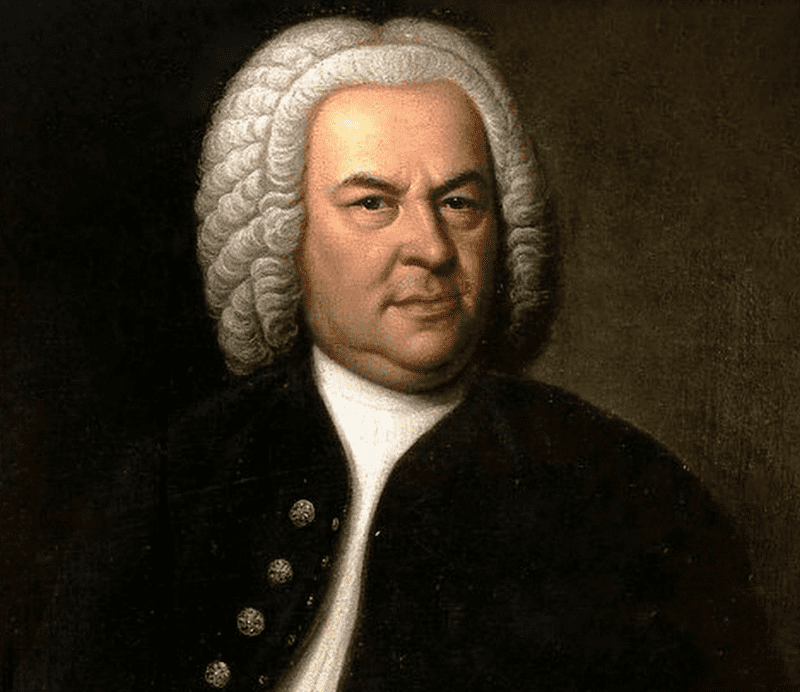
Aria from Peasant Cantata
(J.S. Bach)
Aria from Peasant Cantata
by J.S. Bach

The “The peasant Cantata” Mer hahn en neue Oberkeet (We have a new governor), BWV 212, is a secular cantata by Johann Sebastian Bach. It was entitled the “Cantate burlesque” (burlesque cantata) by Bach himself, but is now popularly known as the Peasant Cantata. It is the latest definitely dated Bach cantata. This cantata’s libretto was written by Christian Friedrich Henrici, known as Picander, and was written for performance on 30 August 1742. On that day the Erbherr, Lehnherr and Gerichtsherr Carl Heinrich von Dieskau, Saxon-Crown-Princely Kammerherr to the Rittergut Kleinzschocher near Leipzig, celebrated his thirty-sixth birthday with a huge fireworks display and, as was customary, took homage from the peasants on the same occasion. It is thought that Picander asked Bach to set his poetry to music.
The text describes how an unnamed farmer laughs with the farmer’s wife Mieke about the tax collector’s machinations while praising the economy of Dieskau’s wife, ending by especially cheering on Dieskau. In places it uses the dialect of Upper Saxony (“Guschel” for mouth, “Dahlen” for love-games, “Ranzen” for belly and “Neu-Schock” for a 60 Groschen piece). The cantata is scored for two voices: the farmer (bass) and Mieke (soprano). The instrumentation includes a string trio of violin, viola and basso continuo, accompanied by a flute, horn and second violin respectively.The piece has 24 movements, more than any other Bach cantata.
Lyrics
1
Ouverture
Violino, Viola, Continuo
2
Aria (Duetto) [Soprano, Bass]
Violino, Viola, Continuo
Mer hahn en neue Oberkeet
We have a new governor
An unsern Kammerherrn.
in our chamberlain.
Ha gibt uns Bier, das steigt ins Heet,
He gives us beer that goes to the head.
Das ist der klare Kern.
That’s the simple truth.
Der Pfarr’ mag immer büse tun;
The parson may be always cross;
Ihr Speelleut, halt euch flink!
musicians, get ready quick !
Der Kittel wackelt Mieken schun,
Mieke’s smock is already shaking,
Das klene luse Ding.
the giddy little thing.
3
Recitative [Bass, Soprano]
Violino, Viola, Continuo
Bass:
Nu, Mieke, gib dein Guschel immer her;
Come on, Mieke, give us a kiss.
Soprano:
Wenn’s das alleine wär.
As if that’s all you want.
Ich kenn dich schon, du Bärenhäuter,
I know what you’re like, you lazy good-for-nothing.
Du willst hernach nur immer weiter.
You always want something more.
Der neue Herr hat ein sehr scharf Gesicht.
The new master has a very sharp look.
Bass:
Ach! unser Herr schilt nicht;
Ah, our master does not scold.
Er weiß so gut als wir, und auch wohl besser,
He knows as well as we do, and even much better,
Wie schön ein bisschen Dahlen schmeckt.
how enjoyable is a little bit of fun.
4
Aria [Soprano]
Violino, Viola, Continuo
Ach, es schmeckt doch gar zu gut,
Ah, it’s a bit too enjoyable
Wenn ein Paar recht freundlich tut;
when a couple get really friendly.
Ei, da braust es in dem Ranzen,
Oh, there is a buzzing in the guts
Als wenn eitel Flöh und Wanzen
just as if fleas and bugs
Und ein tolles Wespenheer
and a crazy swarm of wasps
Miteinander zänkisch wär.
were annoyed with each other.
5
Recitative [Bass]
Continuo
Der Herr ist gut: Allein der Schösser,
The master is good : but the tax-collector
Das ist ein Schwefelsmann,
comes straight out of hell.
Der wie ein Blitz ein neu Schock strafen kann,
Quick as a lightning flash he can slap a new land-tax on us
Wenn man den Finger kaum ins kalte Wasser steckt.
the very moment that we’ve just got out of hot water.
6
Aria [Bass]
Violino, Viola, Continuo
Ach, Herr Schösser, geht nicht gar zu schlimm
Ah. Mr tax- collector, don’t be too hard
Mit uns armen Bauersleuten üm!
with us poor peasants.
Schont nur unsrer Haut;
Leave us our skin.
Fresst ihr gleich das Kraut
Eat up the cabbage
Wie die Raupen bis zum kahlen Strunk,
like the caterpiilars to the bare stalk.
Habt nur genung!
That should be enough!
7
Recitative [Soprano]
Continuo
Es bleibt dabei,
But it’s still the truth
Dass unser Herr der beste sei.
that our master is the best.
Er ist nicht besser abzumalen
You can’t picture a better
Und auch mit keinem Hopfensack voll Batzen zu bezahlen.
and he’s not to be paid with a hop-sack full of pennies.
8
Aria [Soprano]
Violino, Viola, Continuo
Unser trefflicher,
Our excellent,
Lieber Kammerherr
dear chamberlain
Ist ein kumpabler Mann,
is a pleasant man
Den niemand tadeln kann.
with whom no one can find fault.
9
Recitative [Bass, Soprano]
Continuo
Bass:
Er hilft uns allen, alt und jung.
He helps us all, old and young.
Und dir ins Ohr gesprochen:
And I’ll whisper in your ear:
Ist unser Dorf nicht gut genung
didn’t our village do well
Letzt bei der Werbung durchgekrochen?
recently to slip through the recruitment?
Soprano:
Ich weiß wohl noch ein besser Spiel,
I know an even better game:
Der Herr gilt bei der Steuer viel.
the master has influence with the tax authorities.
10
Aria [Soprano]
Violino, Viola, Continuo
Das ist galant,
That is polite,
Es spricht niemand
nothing is said
Von den caducken Schocken.
about the lapsed land-taxes.
Niemand redt ein stummes Wort,
Nobody says a word,
Knauthain und Cospuden dort
but [the villages] of Knauthain and Cospuden
Hat selber Werg am Rocken.
have scarcely a shirt on their back.
11
Recitative [Bass]
Continuo
Und unsre gnädge Frau
And our gracious lady
Ist nicht ein prinkel stolz.
is not at all haughty.
Und ist gleich unsereins ein arm und grobes Holz,
She’s made of rough wood just like us,
So redt sie doch mit uns daher,
she talks with us
Als wenn sie unsersgleichen wär.
just as if she were one of us.
Sie ist recht fromm, recht wirtlich und genau
She’s really upright, really hospitable and careful
Und machte unserm gnädgen Herrn
and for our gracious master
Aus einer Fledermaus viel Taler gern.
she happily turns pennies into pounds.
12
Aria [Bass]
Violino, Viola, Continuo
Fünfzig Taler bares Geld
Fifty talers of ready cash
Trockner Weise zu verschmausen,
for a feast without drink
Ist ein Ding, das harte fällt,
is something that seems tough,
Wenn sie uns die Haare zausen,
even if they tousle my hair.
Doch was fort ist, bleibt wohl fort,
But what’s gone is gone.
Kann man doch am andern Ort
It’s possible somewhere else
Alles doppelt wieder sparen;
to save twice as much.
Laßt die fünfzig Taler fahren!
Let the fifty talers go!
13
Recitative [Soprano]
Continuo
Im Ernst ein Wort!
Be serious for a moment!
Noch eh ich dort
Before I can think
An unsre Schenke
of our tavern
Und an den Tanz gedenke,
and the dance,
So sollst du erst der Obrigkeit zu Ehren
Ein neues Liedchen von mir hören.
you must listen to a little new song from me
in honour of the governor.
14
Aria [Soprano]
Flauto traverso, Violino I/II, Viola, Continuo
Klein-Zschocher müsse
Klein-Zschocher should be
So zart und süße
as tender and sweet
Wie lauter Mandelkerne sein.
as pure almonds.
In unsere Gemeine
In our community
Zieh heute ganz alleine
there should be today nothing but
Der Überfluss des Segens ein.
an abundance of blessings.
15
Recitative [Bass]
Continuo
Das ist zu klug vor dich
That’s too smart for you
Und nach der Städter Weise;
and like the ways of townfolk.
Wir Bauern singen nicht so leise.
We peasants do not sing so quietly.
Das Stückchen, höre nur, das schicket sich vor mich!
Just listen to this little piece, this is what suits me!
16
Aria [Bass]
Corno, Violino, Viola, Continuo
Es nehme zehntausend Dukaten
May ten thousand ducats be taken
Der Kammerherr alle Tag ein!
by the chamberlain every day!
Er trink ein gutes Gläschen Wein,
May he drink a good glass of wine
Und lass es ihm bekommen sein!
and may it agree with him!
17
Recitative [Soprano]
Continuo
Das klingt zu liederlich.
That sounds too sloppy.
Es sind so hübsche Leute da,
There are fine folk there
Die würden ja
who would certainly
Von Herzen drüber lachen;
laugh in your face,
Nicht anders, als wenn ich
just as if I
Die alte Weise wollte machen:
were to sing the old tune:
18
Aria [Soprano]
Corno, Violino, Viola, Continuo
Gib, Schöne,
Give us, fair one,
Viel Söhne
many sons
Von artger Gestalt,
with charming figures
Und zieh sie fein alt;
and let them grow up well.
Das wünschet sich Zschocher und Knauthain fein bald!
This is what Zschocher and Knauthain want to have soon!
19
Recitative [Bass]
Continuo
Du hast wohl recht.
You’re quite right.
Das Stückchen klingt zu schlecht;
My little piece sounds too mean.
Ich muss mich also zwingen,
I must make an effort to sing
Was Städtisches zu singen.
something like they do in town.
20
Aria [Bass]
Violino, Continuo
Dein Wachstum sei feste und lache vor Lust!
May your growth be steady and laugh with delight!
Deines Herzens Trefflichkeit
The goodness of your heart
Hat dir selbst das Feld bereit’,
has prepared the field for you
Auf dem du blühen musst.
in which you must flourish.
21
Recitative [Soprano, Bass]
Continuo
Soprano:
Und damit sei es auch genung.
And that’s enough of that.
Bass:
Nun müssen wir wohl einen Sprung
Now we should just take a step
In unsrer Schenke wagen.
into our tavern.
Soprano:
Das heißt, du willst nur das noch sagen:
That means you only want to say one thing:
22
Aria [Soprano]
Violino, Viola, Continuo
Und dass ihr’s alle wisst,
And so you all know,
Es istnunmehr die Frist
it is now the time
Zu trinken.
for drinking.
Wer durstig ist, mag winken.
Thos who are thirsty should make a sign.
Versagt’s die rechte Hand,
If your right hand refuses,
So dreht euch unverwandt
then turn at once
Zur linken!
to the left!
23
Recitative [Bass, Soprano]
Continuo
Bass:
Mein Schatz, erraten!
My darling, you guessed!
Soprano:
Und weil wir nun
And since we now
Dahier nichts mehr zu tun,
have nothing more to do here,
So wollen wir auch Schritt vor Schritt
we also should step along
In unsre alte Schenke waten.
and wend our way to our old tavern.
Bass:
Ei! hol mich der und dieser,
Hey! Fetch me this man and that man!
Herr Ludwig und der Steur-Reviser
Herr Ludwig and the tax-collector
Muß heute mit.
must join us today.
24
Chorus [Soprano, Bass]
Violino, Viola, Continuo
Wir gehn nun, wo der Dudelsack
We are going now, where the bagpipes
In unsrer Schenke brummt;
drone in our tavern
Und rufen dabei fröhlich aus:
and we shout with joy as we go:
Es lebe Dieskau und sein Haus,
long live Dieskau and his family,
Ihm sei beschert,
may he be blessed
Was er begehrt,
with what he desires
Und was er sich selbst wünschen mag!
and all that he can wish for himself!








































